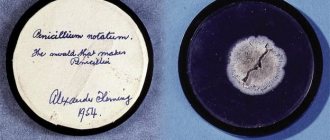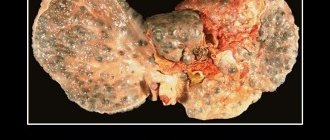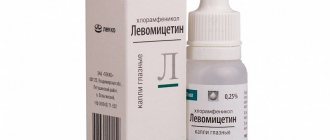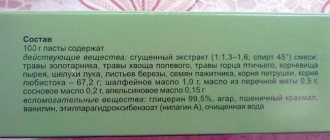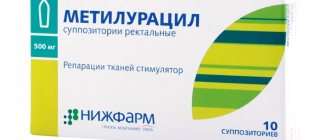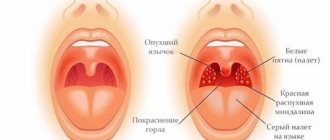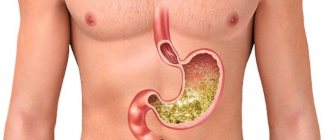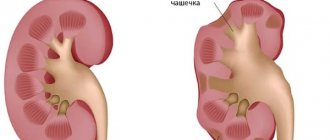Cystitis is a pathology characterized by the development of an inflammatory process that affects the wall of the bladder as a result of exposure to bacterial microorganisms.
Statistical cystitis is one of the most common urological pathologies. Women are much more predisposed to the occurrence of this inflammation, due to their morphophysiological characteristics.
What is cystitis?
Cystitis is an inflammation of the bladder. Women are six times more likely to get this disease than men. Moreover, women of reproductive age are most prone to cystitis. This trend is explained by the fact that the urethra of the fair sex is wider and narrower than that of men. This anatomical feature facilitates the penetration of pathogenic microorganisms from the external environment into the bladder.
Depending on the course, acute and chronic cystitis are distinguished.
Acute cystitis in women has a sudden onset, that is, its symptoms appear almost immediately after exposure to an unfavorable factor.
Chronic cystitis is characterized by a long course with periods of exacerbation and subsidence of symptoms. Most often, this type of disease occurs against the background of other diseases of the internal organs, primarily the genitourinary system.
Chronic cystitis is more dangerous than acute cystitis, since during the disease the cells of the epithelium of the bladder change and cysts are formed, which can degenerate into a malignant tumor.
Forms of the inflammatory process
In the acute form, the doctor prescribes treatment taking into account the symptoms. Chills, weakness and fever require taking fluoroquinolones (Co-trimoxazole, Trometamol). Therapy for chronic cystitis is carried out taking into account the stage of the disease:
- latent;
- persistent;
- interstitial.
Any medicine is drunk at regular intervals. At the initial stage of the disease, one-time use of the medication is allowed. In such cases, urologists use the following treatment regimen:
- Monural;
- Levofloxacin;
- Ceftibuten.
Monural is most often prescribed. With one tablet you can quickly reduce pain. The advantage of the medicine is that it increases its concentration in urine in the shortest possible time. If the disease occurs due to a fungus, then take antifungal tablets:
- Fluconazole;
- Lamisil;
- Mycosept.
We suggest you read: Cystitis in dogs: symptoms and treatment
Why does cystitis appear in women?
The main reason for the development of cystitis is the penetration of pathogenic microorganisms into the bladder cavity. The causative agent of the disease can be bacteria, viruses, fungi and even protozoa. Most often, cystitis of a bacterial nature is observed, when the causative agent is Escherichia coli.
The most common types of cystitis in women are defloration and associated with sexual intercourse.
In addition to pathogenic bacteria, the following factors can cause cystitis:
- taking certain medications, such as Ifosfamide or Cyclophosphamide;
- ionizing radiation, which is used in the treatment of cancer;
- a foreign body, which can be a urethral catheter;
- exposure to chemicals that are part of personal care products;
- other diseases of the genitourinary system, for example, urolithiasis, prostatitis;
- damage to the spinal column, etc.
In some cases, it is not possible to determine the cause of the disease, so this cystitis is called interstitial.
There are also a number of factors that contribute to the development of the inflammatory process in the bladder, which include the following:
- local or general hypothermia of the body;
- stagnation of urine in the bladder;
- sedentary lifestyle;
- unbalanced and unhealthy diet (eating large amounts of hot and spicy foods);
- pregnancy;
- childbirth;
- failure to comply with personal hygiene rules;
- wearing tight or synthetic underwear and clothing;
- sexual infections;
- surgical interventions and invasive research methods on the organs of the reproductive and urinary systems.
Prevention
If you remove from everyday life all the causes and factors that provoke an attack, then this will be the best prevention. Here are the main preventive measures:
- Improving the functioning of the body, based on boosting immunity.
- There is an urgent need to get rid of inflammatory foci and acute infectious pathologies.
- It is necessary to observe the rules of personal hygiene.
- It is important to improve the culture of sexual behavior. Avoid promiscuity in intimate relationships, take precautions with new partners, use barrier means of protection, practicing non-traditional types of sexual acts.
- Avoid prolonged exposure to the cold.
Being healthy is not difficult, you just need to consciously reconsider your lifestyle and make timely adjustments.
How does cystitis manifest in women?
The first signs of cystitis in women may be as follows:
- frequent urge to urinate;
- feeling of bladder fullness;
- pain in the lower abdomen;
- pain and burning along the urethra after urination;
- the appearance of pathological impurities in the urine (mucus, blood, pus).
In severe cases, the clinical picture of cystitis can be supplemented by symptoms of general intoxication of the body, namely: increased body temperature, general weakness, chills, excessive sweating, etc.
If you are concerned about the above symptoms, do not under any circumstances engage in self-diagnosis or self-medication, as this does not always bring the expected result.
Causes and factors of appearance
Approximately 70% of patients seeking help from a urologist suffer from a urinary tract infection. Moreover, women suffer 14 times more often than men. As already mentioned, it’s all about anatomical features. Representatives of the fairer sex have a wider and shorter urethra than men, which is why bacteria have a greater chance of getting inside. In addition, the opening of the urethra in women is located close to the anus, which compromises the high risk of E. coli (the most common causative agent of infectious cystitis) entering the urethra. This bacterium inhabits the intestines and is part of its healthy microflora, but when it gets into the urethra, it becomes a threat not only to the bladder, but also to the entire urinary tract. But this is far from the only cause of the disease.
Although women suffer from cystitis more often, not all of them are equally predisposed to the disease.
The high-risk areas include:
- non-compliance with personal hygiene rules;
- leading a very active sex life with frequent changes of partners (although a certain risk is simply frequent and very active sex);
- girls who have just begun sexual activity (this phenomenon has its own name - “honeymoon” cystitis);
- using certain contraceptives, in particular diaphragms with spermicides;
- pregnant women (due to hormonal changes, diagnosed in 10% of expectant mothers);
- when breastfeeding (when the body is still recovering after childbirth);
- after menopause (hormonal imbalances occur during menopause).
Cystitis often appears in women after childbirth. This is due to the characteristics of the birth act (E. coli entering the urethra, bladder injury) or the disease is the result of infection with streptococcus or staphylococcus.
Wearing tight underwear, constipation and intestinal diseases also contribute to cystitis. The disease can be triggered by infection during surgery or injury. For many women, clinical signs of inflammation appear at certain phases of the menstrual cycle: in some before menstruation, in others during or after, and in others on the day of ovulation.
Without any predisposing causes, cystitis is rare in men. As a rule, the secondary form affects people over 40 years of age.
Risk factors for men:
- impaired urination (due to prostatic hypertrophy, the presence of stones in the urinary tract in the bladder, cancer);
- inflammatory processes (in any area of the genitourinary system);
- weakening of the immune response (due to diabetes, HIV infection, chemotherapy);
- long-term use of catheters to remove urine (in older people or people with chronic diseases);
- developmental abnormalities in the urinary system.
The most common cause of infectious cystitis is sexual intercourse. Postcoital cystitis (especially if this is the first sexual intercourse with a new partner) occurs 13 times more often than for other reasons. In this case, the first symptoms of the disease appear within 24 hours after sexual intercourse, maximum every other day. Other causes of the disease include parasites, contact dermatitis and even a psychological factor.
Childhood cystitis can be a consequence of hypothermia, vitamin deficiency, abnormal development of the urinary system, genetic predisposition, taking certain medications, or insufficient hygiene. Cystitis in infants is almost always the result of untimely changing of diapers.
Which doctor treats cystitis in women?
A urologist diagnoses and treats cystitis. Only a specialist knows how to properly treat this disease in order to avoid chronicity of the inflammatory process and not cause harm to health.
Therefore, if you experience at least one of the above signs of cystitis, contact your nearest clinic for an appointment with a urologist. The doctor, after conducting a comprehensive examination of the body, will make an accurate diagnosis and select the most effective treatment regimen for you.
Diagnostics
The acute form of cystitis is diagnosed based on the woman’s complaints. If they do not coincide with the characteristic signs of the disease, there is vaginal discharge and at a doctor’s appointment it turns out that there are risk factors, then a laboratory urine test and examination in a gynecological chair are prescribed.
If 6 or more leukocytes are found in the urine under a microscope, this is a clear sign of inflammation.
If pyelonephritis is suspected, if the symptoms of acute cystitis are not typical, or a pregnant woman is ill, then before treating the inflammation, urine culture must be prescribed. An indicator of the disease is the presence of more than 100,000 CFU/ml of pathogenic bacteria in a portion of urine.
What tests are performed for cystitis?
To confirm cystitis, the specialist must prescribe the following tests to the patient:
- general urine analysis;
- urine analysis according to Nechiporenko;
- bacteriological examination of urine;
- cystoscopy;
- ultrasound examination of the bladder and abdominal organs, including the kidneys.
In urine with cystitis, you can find a large number of white blood cells, bladder epithelium, as well as bacteria that caused this disease.
Urine culture allows you to determine which microbe caused cystitis and which antibacterial drug it is sensitive to and which it is resistant to, which greatly facilitates the selection of an effective treatment regimen.
Protein in the urine during cystitis, regardless of its quantity, should in no case go unnoticed, since its appearance may be a sign of impaired kidney function.
Cystoscopy is an endoscopic examination of the bladder, which is performed using a special device - a cystoscope. A cystoscope is a metal tube equipped with a video camera and a set of instruments, which is inserted through the urethra into the bladder. Using this study, you can carefully examine the bladder mucosa, take material for histological analysis, and, if necessary, perform a minor operation, for example, remove a polyp.
An ultrasound examination of the bladder and kidneys is carried out to assess the condition of the organ itself and surrounding tissues.
How to treat cystitis?
Treatment of cystitis is mainly carried out on an outpatient basis under the guidance of a urologist.
Indications for hospitalization of patients may be severe intoxication syndrome, spread of the inflammatory process to the kidneys, or cystitis in pregnant women. You can treat cystitis at home only after consulting a urologist, since all drugs have side effects, and folk remedies are not effective enough to cope with bacterial inflammation.
An experienced specialist can cure acute cystitis quickly, in about 2-3 days, but the fight against chronic inflammation of the bladder can take several weeks.
Before treating chronic cystitis, it is necessary to find out the cause, because only by eliminating it can a positive effect of therapy be achieved.
When treating cystitis, especially recurrent cystitis, a single use of an antibiotic is not enough, since pathogenic microorganisms quickly develop resistance. For example, E. coli has become resistant to many types of antibiotics. As a result, the dosage of antibiotics has to be constantly increased. The drug Macmiror belongs to the category of antimicrobial agents with antibacterial, antifungal and antiprotozoal effects. And due to the properties of its molecule, microbes have practically no resistance to it.
In case of recurrent cystitis, examination by a gynecologist is also recommended, and if vaginitis or bacterial vaginosis is detected, Macmiror Complex vaginal capsules can be used topically along with an antimicrobial drug orally. This increases the effectiveness and speed of healing. And the fact that untreated gynecological infections can influence the frequency of relapses of cystitis is a medically proven fact.
When treating cystitis, specialists are guided by the following principles:
- bed or semi-bed rest throughout the entire period of acute symptoms of the disease;
- therapeutic nutrition. The diet for cystitis should be dairy-vegetable, that is, fermented milk products, vegetables and fruits should predominate in the patient’s daily diet. Fried, hot, salty and spicy foods, as well as alcoholic drinks are strictly prohibited;
- antibacterial therapy. Antibiotics are prescribed first with a broad spectrum of action, and after obtaining the results of urine culture and antibiogram. An antimicrobial drug is used, to which the causative agent of cystitis is sensitive;
- analgesic therapy. For severe pain in the bladder, patients are prescribed painkillers and antispasmodics;
- installation of antiseptics in the bladder;
- phytotherapy. Diuretic herbs and herbs are used. Let's look at it in more detail below;
- physiotherapeutic treatment (electrophoresis, phonophoresis, inductothermy, UHF and others).
There are also cases when chronic cystitis in women has to be treated using surgical methods. Surgery is necessary if the outflow of urine from the bladder is impaired by a stone, tumor or foreign body. Also, surgical intervention is indispensable when the walls of the bladder become wrinkled, when an antiseptic solution is injected into it under general anesthesia to straighten it.
Diet
Inflammation of the bladder requires not only antibiotic therapy, but also changes in diet.
Basic diet requirements:
- Drink more fluid. It is better to drink plain water, still mineral water, cranberry and lingonberry fruit drinks. Avoid tea, coffee, carbonated drinks, and alcohol.
- Do not eat foods containing large amounts of salt, spices, fatty soups, vegetables rich in essential oils.
Such drinks and foods irritate the urinary tract and increase inflammation. Fruits rich in vitamins, dairy and plant foods are shown.
What antibiotics treat cystitis?
Antibiotics occupy a central place in the treatment of acute and chronic cystitis. The selection of an antibacterial drug should be done exclusively by a specialist, since self-medication can lead to irreversible health consequences.
Let's look at the most effective antibiotics used for cystitis in women.
Nitroxoline
Nitroxoline is a derivative of eight-hydroxyquinoline and belongs to the oxyquinolones. The drug is active against most gram-positive and gram-negative microbes, as well as some fungi, in particular candida.
Nitroxoline is indicated for cystitis, urethritis and pyelonephritis.
Scheme and doses: 2 tablets (100 mg) 4 times a day with meals for 14-21 days.
Cost of the drug: 120-170 rubles.
nitroxoline
Monural
Monural is a broad-spectrum antibiotic with bactericidal properties, which is obtained by processing phosphonic acid.
Monural is prescribed for acute cystitis and urethritis of a bacterial nature. In addition, this drug can treat cystitis with blood, as well as asymptomatic bacteriuria in a pregnant woman, but provided that the potential benefit is higher than the probable risk to the fetus.
Scheme and doses: for adults the drug is prescribed once (3 grams), but if necessary, the dose can be repeated every other day. Children over 5 years old are recommended to take only a single dose of 2 grams.
Monural is a powerful antiseptic, so there is no need to do a urine culture or antibiogram before using it.
Before taking the granules, dissolve 60 ml of warm water and drink the solution on an empty stomach or before bed.
Cost: 380-500 rubles.
Monural
Furadonin
Furadonin is a representative of a number of nitrofurans, the main purpose of which is the treatment of urinary tract infections. The drug is active against most gram-positive and gram-negative microorganisms, but resistance to this drug often develops.
Furadonin is prescribed for the treatment of cystitis, urethritis, pyelonephritis, as well as for the prevention of urinary tract infections after invasive diagnostic methods (cystoscopy, urography, etc.).
Scheme and doses: adults are prescribed 100-150 mg 3 to 4 times a day after meals for 7-10 days. The drug should be taken with plenty of liquid.
Cost: 80-160 rubles.
Furadonin
Furamag
Furamag belongs to the antimicrobial drugs of the nitrofuran series, which have a wide spectrum of action. Resistance to this drug practically does not develop. In addition, Furamag not only destroys pathogenic bacteria, but also reduces the synthesis of their toxins, and also strengthens the body's defenses.
Furamag is used for cystitis, urethritis and pyelonephritis, as well as for some gynecological infections.
Scheme and doses: 1-2 (50-100 mg) tablets three times a day after meals. Children: 1-2 (25-50 mg) tablets 3 times a day. The duration of treatment is determined by the attending physician and usually takes from 7 to 10 days.
Cost: 480-700 rubles.
Furamag
Nevigramon
Nevigramon is an antibacterial drug that has a detrimental effect on almost all known pathogenic bacteria.
Nevigramon has an impressive list of indications, including urinary tract infections, in particular cystitis, urethritis, pyelonephritis, pyelitis and others.
Scheme and doses: adults are prescribed 2 tablets (1000 mg) 4 times a day for a week. For children over two years of age, the daily dose is 60 mg/kg, divided into 3-4 doses.
Cost: 5400 rubles.
User reviews
In their reviews, users often praise some drugs that help with cystitis. For example, Urinal capsules have proven themselves well. Many women like the fact that they contain plant components of cranberry extract. The capsules have a rich burgundy hue and are packaged in a plastic container.
For acute cystitis, the antibiotic Uronormin is also often prescribed. It is a white powder that should be dissolved in water. According to users, after the first dose of the powder, pain disappears and the process of urination improves.
You can also often find good reviews about the drug “Nolitsin” in the form of orange tablets, divided by a score. As a rule, the entire treatment process takes no more than three days, after which recovery occurs. Users consider the only drawback of this product to be the rather large size of the tablet, which is sometimes difficult to swallow.
Herbal preparations for cystitis
Cystitis and urethritis in women can also be treated with herbal remedies, which are not inferior in effectiveness to synthetic analogues. Let's look at them.
Canephron N
Canephron is available in the form of tablets or drops, which consist of rosemary leaves, lovage and yarrow roots.
Canephron effectively eliminates pain in the urethra and reduces the severity of the inflammatory process in the bladder. It can also be used to prevent exacerbations of cystitis.
Scheme and doses: adult women are prescribed two tablets or 50 drops three times a day before meals.
Cost: 410-480 rubles.
Monurel
Monurel is an extract of cranberry fruits combined with ascorbic acid.
The drug has antimicrobial, diuretic, and immunostimulating properties. Monurel is used both for the treatment and prevention of exacerbations of cystitis.
Scheme and doses: 1 tablet before bedtime for 30 days.
Cost: 470 rubles.
Cyston
Cyston is a medicine that consists of more than ten plant components. The drug has anti-inflammatory, analgesic, antimicrobial and diuretic properties. Cyston also dissolves stones in the urinary tract and prevents their formation.
Regimen and doses: two tablets twice a day for 2-3 weeks.
Cost: 380 rubles.
Urolesan
The drug is available in the form of capsules and drops. Studies show that in general their effectiveness is the same, but the drops begin to act a little faster - within a few hours after the first dose.
Urolesan contains:
- peppermint oil;
- wild carrot fruits;
- oregano herb;
- hop cones;
- fir oil
Scheme and doses: one capsule three times a day, washed down with plenty of water, or 10 drops per piece of sugar three times a day.
Cost: 330-380 rubles.
Main characteristics of the drug Monural
Monural is a modern antibacterial drug that is used to treat bacterial cystitis in children over 16 years of age and adults. It comes in the form of white granules with a citrus aroma. An oral aqueous solution is prepared from them. The dosage of the drug should be chosen by the treating doctor. Before taking an antibiotic, you must visit the toilet and empty your bladder.
The drug should not be used by people with severe hypersensitivity to its components, as well as by patients with severe renal failure. It is prohibited to use the antibiotic by pregnant or nursing mothers.
When using an antibiotic, some unpleasant symptoms may sometimes occur:
- nausea;
- bowel dysfunction;
- headache;
- heartburn;
- tachycardia;
- vulvovaginitis.
Cheaper analogues of Monural are:
- Cystoral;
- Phosphoral Rompharm;
- Ecomural.
How to treat cystitis with folk remedies in women at home?
You can treat cystitis at home with traditional medicines. Only before starting such treatment should you consult with your doctor. It is also necessary to understand that traditional methods and remedies are not effective enough to cure cystitis completely, and therefore can be used exclusively as a complement to the main therapy.
We bring to your attention the simplest and most effective methods of treating cystitis with folk remedies.
Dill seeds
At home, women with cystitis have been using dill, or rather its seeds, for a long time.
Both decoction and infusion are suitable for treatment. To prepare the infusion, pour boiling water over one tablespoon of dill seeds, cover with a lid and leave for 2-3 hours.
The decoction is prepared as follows: one tablespoon of dill seeds is poured into a glass of water and put on fire; after the drug boils, the intensity of the fire decreases. You need to boil the broth for 4-5 minutes. After this, the finished medicine is removed from the heat and filtered through a fine sieve.
A decoction or infusion of dill seeds is taken one glass three times a day until the symptoms of cystitis subside.
Millet
A decoction of millet will help quickly cure cystitis and urethritis in women. To prepare this medicine, you will need two tablespoons of millet, which you need to pour 500 ml of boiling water and boil over low heat for 4-5 minutes. After this, remove the broth from the heat, let it brew for 10 minutes and pour the liquid into a glass.
On the first day, during an acute attack of cystitis or urethritis, take 20 ml of millet decoction every hour throughout the day, on the second day - 60 ml every hour, and on the third - 100 ml every hour. The course of treatment is one week.
Pharmaceutical chamomile
10 grams of pharmaceutical chamomile should be poured into 250 ml of boiling water, cover with a lid and let steep for 15-20 minutes.
Drink 60 ml of the finished medicine 30 minutes before meals until the disease subsides.
Cowberry
Berries and leaves are widely used for diseases of the urinary system. The berries can be consumed daily, preferably before breakfast, and an infusion can be made from the leaves.
One tablespoon of crushed fresh leaves of the plant is poured with 250 ml of boiling water, covered with a lid and allowed to brew for 2-3 hours. In case of an acute attack of cystitis, it is recommended to drink 60 ml of infusion three times a day for 4-5 days.
Baking soda
The baking soda solution can be taken orally or used to rinse the bladder.
The solution is prepared at the rate of one tablespoon per 4 cups of boiled water. Drink this medicine 15 ml three times a day.
